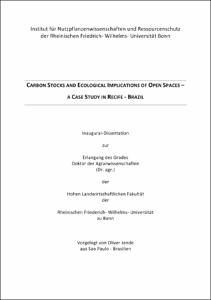Jende, Oliver: Carbon Stocks and Ecological Implications of Open Spaces : A Case Study in Recife - Brazil. - Bonn, 2011. - Dissertation, Rheinische Friedrich-Wilhelms-Universität Bonn.
Online-Ausgabe in bonndoc: https://nbn-resolving.org/urn:nbn:de:hbz:5N-25807
Online-Ausgabe in bonndoc: https://nbn-resolving.org/urn:nbn:de:hbz:5N-25807
@phdthesis{handle:20.500.11811/4737,
urn: https://nbn-resolving.org/urn:nbn:de:hbz:5N-25807,
author = {{Oliver Jende}},
title = {Carbon Stocks and Ecological Implications of Open Spaces : A Case Study in Recife - Brazil},
school = {Rheinische Friedrich-Wilhelms-Universität Bonn},
year = 2011,
month = jul,
note = {The aim of this work is to evaluate the ecological implications of the whole range of urban and rural land use systems from a common perspective focused on carbon stocks and land use change (LUC) in urbanizing areas of Recife in Brazil. To analyze the open spaces (OS), 22 representative experimental areas were defined, that represent 6 experimental systems identified in the urban to rural transect; natural forest, fallow land, perennial crops, annual crops, recreation areas and street trees. A common methodological approach was applied to all systems during a 24 month survey composed of field measurements and personal interviews on a household/farm level between 2005 and 2006. The structural composition, carbon stocks, biodiversity, indicators of resilience (Ri) and cooling potential were analyzed and projected to 6 case studies representing typical landscapes undergoing rapid changes in the peri-urban fringe of Recife. A social profile was drawn to support the understanding of the LUC process on a household/farm level and enable the creation of a scenario in which carbon stocks are kept neutral in the rural to urban LUC process, maintaining functions of OS to their users. The parameters analyzed undergo a huge variation across the experimental systems which distribution in turn undergoes a huge variation across the case studies. Recreation areas stored almost half of the carbon (24,23 t/ha) than natural forest fragments (48,33 t/ha) and perennial crops (61,77 t/ha) but had the highest Ri (206) and plant diversity (62 species). In densely populated areas the income generating functions of OS are reduced, resulting in proportionally more fallow land (50%) than in less populated areas (13,07%) and the extinction of natural forest fragments on a household level. The importance of perennial crops is almost maintained from 35% to 29% due to their role in supporting subsistence in poor households. Considering the functionality of OS across the study area, a distribution of 23% build-up, 18% natural forest, 24% perennial crops, 19% annual crops and 16% recreation area could compensate the carbon stocks reduced during the urbanization process. Any further reduction of OS would implicate in a compromise of functions to the settlers and/or carbon stocks. Finally are discussed the (i) ecological implications of the land-use systems; (ii) the implications of LUC; (iii) a future outlook about Emergy analysis and sustainability; and (iv) a prospective/strategic open space planning approach for the peri-urban fringe of megacities.},
url = {https://hdl.handle.net/20.500.11811/4737}
}
urn: https://nbn-resolving.org/urn:nbn:de:hbz:5N-25807,
author = {{Oliver Jende}},
title = {Carbon Stocks and Ecological Implications of Open Spaces : A Case Study in Recife - Brazil},
school = {Rheinische Friedrich-Wilhelms-Universität Bonn},
year = 2011,
month = jul,
note = {The aim of this work is to evaluate the ecological implications of the whole range of urban and rural land use systems from a common perspective focused on carbon stocks and land use change (LUC) in urbanizing areas of Recife in Brazil. To analyze the open spaces (OS), 22 representative experimental areas were defined, that represent 6 experimental systems identified in the urban to rural transect; natural forest, fallow land, perennial crops, annual crops, recreation areas and street trees. A common methodological approach was applied to all systems during a 24 month survey composed of field measurements and personal interviews on a household/farm level between 2005 and 2006. The structural composition, carbon stocks, biodiversity, indicators of resilience (Ri) and cooling potential were analyzed and projected to 6 case studies representing typical landscapes undergoing rapid changes in the peri-urban fringe of Recife. A social profile was drawn to support the understanding of the LUC process on a household/farm level and enable the creation of a scenario in which carbon stocks are kept neutral in the rural to urban LUC process, maintaining functions of OS to their users. The parameters analyzed undergo a huge variation across the experimental systems which distribution in turn undergoes a huge variation across the case studies. Recreation areas stored almost half of the carbon (24,23 t/ha) than natural forest fragments (48,33 t/ha) and perennial crops (61,77 t/ha) but had the highest Ri (206) and plant diversity (62 species). In densely populated areas the income generating functions of OS are reduced, resulting in proportionally more fallow land (50%) than in less populated areas (13,07%) and the extinction of natural forest fragments on a household level. The importance of perennial crops is almost maintained from 35% to 29% due to their role in supporting subsistence in poor households. Considering the functionality of OS across the study area, a distribution of 23% build-up, 18% natural forest, 24% perennial crops, 19% annual crops and 16% recreation area could compensate the carbon stocks reduced during the urbanization process. Any further reduction of OS would implicate in a compromise of functions to the settlers and/or carbon stocks. Finally are discussed the (i) ecological implications of the land-use systems; (ii) the implications of LUC; (iii) a future outlook about Emergy analysis and sustainability; and (iv) a prospective/strategic open space planning approach for the peri-urban fringe of megacities.},
url = {https://hdl.handle.net/20.500.11811/4737}
}






